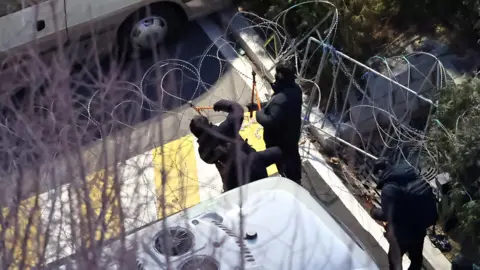 Reuters
ReutersSouth Korea’s Yoon Suk Yeol has become the country’s first sitting president to be arrested, ending a weeks-long standoff between investigators and his presidential security team.
Yoon, whose failed attempt to impose martial law plunged the country into turmoil and saw him impeached by parliament, is being investigated on charges of insurrection.
He is, however, still technically the president as a constitutional court has to decide whether his impeachment is valid.
Investigators used ladders and wirecutters in the freezing cold to get to Yoon, whose Presidential Security Service (PSS) personnel had erected barricades in a bid to thwart his arrest.
The CIO had previously attempted to arrest him on 3 January but they were blocked by buses and barbed wire.
But just before dawn on Wednesday, a team of investigators arrived, this time armed with ladders to bypass bus barricades and pliers to cut through barbed wire fences.
Other members of the team – which numbered around 1,000 officers – scaled walls and hiked up nearby trails in a bid to reach the presidential residence.
After several hours, authorities announced that Yoon had been arrested.
In a three- minute video released just before his arrest, the 64-year-old leader said he would comply with the investigation against him even though he was against it.
Yoon has consistently maintained that the warrant for his arrest is not legally valid.
He said he witnessed how authorities “invaded” his home’s security perimeter with fire equipment.
“I decided to appear before the CIO, even though it is an illegal investigation, in order to prevent any unsavoury bloodshed,” he said.
Yoon’s People Power Party decried his arrest as “illegal”, with floor leader Kweon Seong-dong describing Wednesday’s events as “regretful”.
On the other hand, the floor leader of the opposition Democratic Party, Park Chan-dae, said Yoon’s arrest showed that “justice in South Korea is alive”.
This arrest “is the first step toward restoring constitutional order, democracy and the rule of law,” he said during a party meeting.
The country is currently being led by Finance Minister Choi Sang-mok as acting president. He was thrust into power after the first acting president, Han Duck-soo, was also impeached by opposition majority parliament.
On Wednesday afternoon, investigators said that Yoon has been questioned but has invoked the right to remain silent. He has been questioned since 11:00 local time on Wednesday and will enter a second round of questioning on Wednesday afternoon.
Yoon is expected to be detained overnight at the Seoul Detention Centre in Uiwang, Gyeonggi Province, approximately 5km (3 mi) from the CIO’s office.
If a court doesn’t issue a detention warrant within 48 hours of Yoon’s arrest, however, he will be released, and free to return to the presidential residence.
While the arrest of a sitting president is remarkable for South Korean politics, the country’s political crisis is far from over.
The crowds outside Yoon’s house on Wednesday morning have underscored deep divisions in the country.
While on one hand, the anti-Yoon crowd cheered, clapped and blasted out a “congratulations and celebrations” song at the announcement of his arrest – the atmosphere on the other end was completely different.
“We are very upset and angry – the rule of law has broken down,” a Yoon supporter had told the BBC.
The vast majority of South Koreans agree that Yoon’s declaration of martial law on 3 Dec was wrong and that he needs to be held accountable, but they cannot agree on what accountability looks like, Duyeon Kim, an adjunct senior fellow at the Center for a New American Security had earlier told the BBC.
All this adds to the current political uncertainty.
The standoff has also pitted two branches of executive power against each other: law enforcement officers, armed with a legal arrest warrant and presidential security staff, who said they were duty bound to protect the suspended president.
